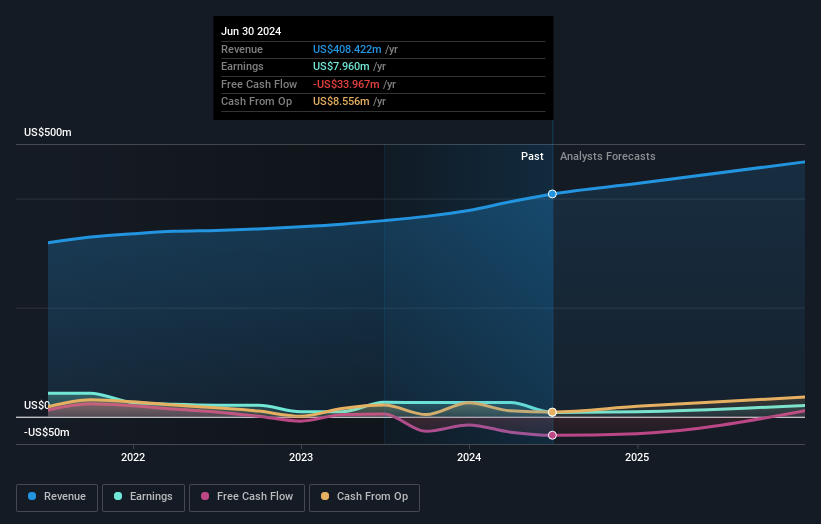- United States
- /
- Consumer Services
- /
- NasdaqGS:LINC
Lincoln Educational Services Corporation's (NASDAQ:LINC) large institutional owners must be happy as stock continues to impress, up 10% over the past week

Key Insights
- Given the large stake in the stock by institutions, Lincoln Educational Services' stock price might be vulnerable to their trading decisions
- 50% of the business is held by the top 15 shareholders
- Using data from analyst forecasts alongside ownership research, one can better assess the future performance of a company
If you want to know who really controls Lincoln Educational Services Corporation (NASDAQ:LINC), then you'll have to look at the makeup of its share registry. The group holding the most number of shares in the company, around 56% to be precise, is institutions. In other words, the group stands to gain the most (or lose the most) from their investment into the company.
And things are looking up for institutional investors after the company gained US$38m in market cap last week. One-year return to shareholders is currently 59% and last week’s gain was the icing on the cake.
Let's delve deeper into each type of owner of Lincoln Educational Services, beginning with the chart below.
See our latest analysis for Lincoln Educational Services

What Does The Institutional Ownership Tell Us About Lincoln Educational Services?
Institutional investors commonly compare their own returns to the returns of a commonly followed index. So they generally do consider buying larger companies that are included in the relevant benchmark index.
As you can see, institutional investors have a fair amount of stake in Lincoln Educational Services. This can indicate that the company has a certain degree of credibility in the investment community. However, it is best to be wary of relying on the supposed validation that comes with institutional investors. They too, get it wrong sometimes. It is not uncommon to see a big share price drop if two large institutional investors try to sell out of a stock at the same time. So it is worth checking the past earnings trajectory of Lincoln Educational Services, (below). Of course, keep in mind that there are other factors to consider, too.

Investors should note that institutions actually own more than half the company, so they can collectively wield significant power. Our data indicates that hedge funds own 11% of Lincoln Educational Services. That's interesting, because hedge funds can be quite active and activist. Many look for medium term catalysts that will drive the share price higher. Our data shows that Juniper Investment Company, LLC is the largest shareholder with 11% of shares outstanding. BlackRock, Inc. is the second largest shareholder owning 5.9% of common stock, and Heartland Advisors, Inc. holds about 4.7% of the company stock. Additionally, the company's CEO Scott Shaw directly holds 3.3% of the total shares outstanding.
Looking at the shareholder registry, we can see that 50% of the ownership is controlled by the top 15 shareholders, meaning that no single shareholder has a majority interest in the ownership.
Researching institutional ownership is a good way to gauge and filter a stock's expected performance. The same can be achieved by studying analyst sentiments. Quite a few analysts cover the stock, so you could look into forecast growth quite easily.
Insider Ownership Of Lincoln Educational Services
While the precise definition of an insider can be subjective, almost everyone considers board members to be insiders. Management ultimately answers to the board. However, it is not uncommon for managers to be executive board members, especially if they are a founder or the CEO.
I generally consider insider ownership to be a good thing. However, on some occasions it makes it more difficult for other shareholders to hold the board accountable for decisions.
We can see that insiders own shares in Lincoln Educational Services Corporation. It has a market capitalization of just US$410m, and insiders have US$30m worth of shares, in their own names. It is good to see some investment by insiders, but it might be worth checking if those insiders have been buying.
General Public Ownership
With a 26% ownership, the general public, mostly comprising of individual investors, have some degree of sway over Lincoln Educational Services. While this size of ownership may not be enough to sway a policy decision in their favour, they can still make a collective impact on company policies.
Next Steps:
I find it very interesting to look at who exactly owns a company. But to truly gain insight, we need to consider other information, too. For instance, we've identified 2 warning signs for Lincoln Educational Services (1 is potentially serious) that you should be aware of.
Ultimately the future is most important. You can access this free report on analyst forecasts for the company.
NB: Figures in this article are calculated using data from the last twelve months, which refer to the 12-month period ending on the last date of the month the financial statement is dated. This may not be consistent with full year annual report figures.
If you're looking to trade Lincoln Educational Services, open an account with the lowest-cost platform trusted by professionals, Interactive Brokers.
With clients in over 200 countries and territories, and access to 160 markets, IBKR lets you trade stocks, options, futures, forex, bonds and funds from a single integrated account.
Enjoy no hidden fees, no account minimums, and FX conversion rates as low as 0.03%, far better than what most brokers offer.
Sponsored ContentNew: AI Stock Screener & Alerts
Our new AI Stock Screener scans the market every day to uncover opportunities.
• Dividend Powerhouses (3%+ Yield)
• Undervalued Small Caps with Insider Buying
• High growth Tech and AI Companies
Or build your own from over 50 metrics.
Have feedback on this article? Concerned about the content? Get in touch with us directly. Alternatively, email editorial-team (at) simplywallst.com.
This article by Simply Wall St is general in nature. We provide commentary based on historical data and analyst forecasts only using an unbiased methodology and our articles are not intended to be financial advice. It does not constitute a recommendation to buy or sell any stock, and does not take account of your objectives, or your financial situation. We aim to bring you long-term focused analysis driven by fundamental data. Note that our analysis may not factor in the latest price-sensitive company announcements or qualitative material. Simply Wall St has no position in any stocks mentioned.
About NasdaqGS:LINC
Lincoln Educational Services
Provides various career-oriented postsecondary education services to high school graduates and working adults in the United States.
Excellent balance sheet with reasonable growth potential.
Similar Companies
Market Insights
Community Narratives




